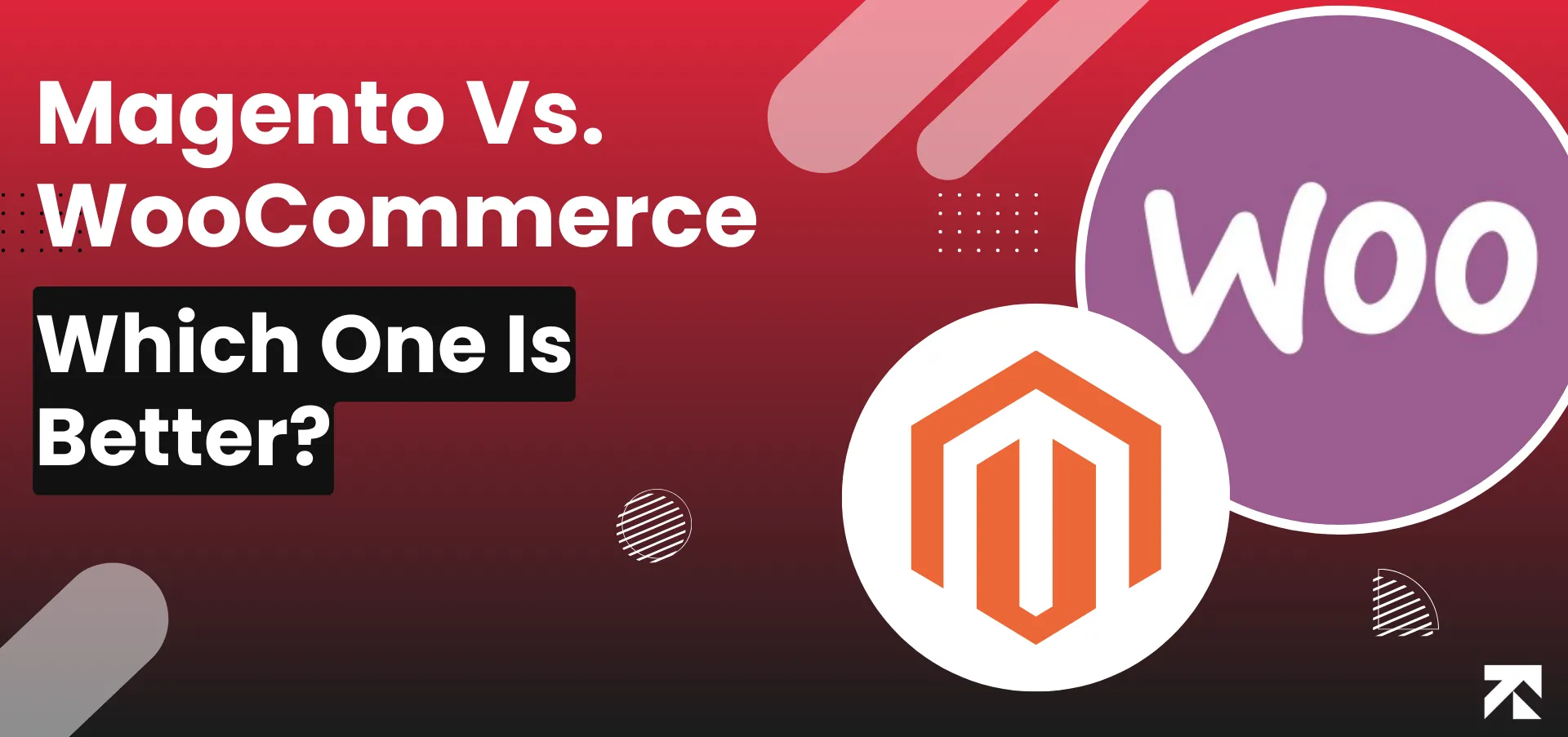It might be challenging to find an ecommerce platform that is affordable and dependable. In particular, when you are frequently exposed to misleading advertising. These advertisements make outrageous claims about amazing costs and limitless capabilities, but in practice they don’t follow through on them and instead offer hosted ecommerce systems that frequently fall short of expectations.
Platforms for hosted e-commerce are a wonderful option for novices. Beginners should be especially wary of platforms that need regular payment of “platform usage fees” in order to “unlock” resources or common functionality. For beginners and startups, it’s advised to seek a reputable company offering WooCommerce development services to start up smoothly.
WooCommerce and Magento are two trustworthy and reliable platforms that have consistently proven their value at several occasions. Now, before we dive into the debate of Magento vs WooCommerce, let us explain to you what you look for in an eCommerce platform before you choose one.
WooCommerce, BigCommerce and Magento are the three best eCommerce development platforms and also competitors to each other. Before we dive into the debate on the best ones be it features, design, security, payment gateways or simply compare WooCommerce vs. BigCommerce or Magento vs. WooCommerce, let us explain to you what to look for in an ecommerce platform so that you can choose one according to your store’s requirements.
Ready to Optimize Your Store?
Unlock e-commerce excellence with our Magento and WooCommerce services.
What to Look For in an Ecommerce Platform
The simplest method to make my claim clear to you is to enumerate all the key features that a platform should offer an owner of an online business, in that order. To assist, we have provided a list of some of the fundamental features that beginner ecommerce platforms should provide:
Reliability:
Trust is every e-commerce store owner’s top concern. Will the platform’s platform keep their data secure? Users of managed e-commerce platforms have completely lost all of their data simply because they failed to renew (or upgrade) their subscription. The first factor in choosing an online business should be the guarantee that the data will be preserved and protected.
Performance:
No ecommerce store owner can ignore the imperativeness of a store’s performance, especially after Google Florida update’. The store’s efficient operation is what determines how everything else works. You shouldn’t run your store in the first place if it takes more than 5 seconds to load.
Scalability:
What if your traffic increases by 300% over the holiday shopping season? Is the hosting platform and infrastructure supporting your shop up to the task? Unless you are using a cloud ecommerce hosting infrastructure that allows for seamless and immediate resource scaling, you cannot escape the scalability problem as a store owner.
Ease of Use:
Are you able to navigate all of the dashboard’s options? Do all of the buttons and toggles have clear instructions? And that only covered the back end. The front end, what about it? Are they appealing? Are they able to WOW the users? Can they generate more sales, too?
Customizations:
Plugins helps in customizing a website, mobile app and even an ecommerce platform. WooCommerce shipping plugins would definitely come in handy when you need to modify your store. This can take place the day your store opens or two years from now. But if your e-commerce platform does not offer customized elements, it will eventually happen, and your firm will suffer as a result.
Payment Methods:
This is possibly the simplest step in choosing an online store. Determine the preferred payment methods for your target market before selecting an e-commerce platform that accepts them all.
Cost:
Utilizing the e-commerce platform’s services will add significantly to your operating expenses. Therefore, choosing the right ecommerce platform requires careful consideration of both platform costs and features. For this, experts advise making a list of required features before choosing the platform that provides them all at the most affordable price.
Security:
A major concern for an online store is security. Make sure the e-commerce platform you have chosen is secure and free of any known flaws. Additionally, keep an eye out for announcements and updates on the official blogs, which show that the platform development team is continually enhancing platform security. The availability of SSL certificates, PCI-DSS compliance, and two-factor authentication for all logins serve as a straightforward indicator of platform security.
Now that we’ve gotten that out of the way, let’s move on to discussing Magento vs WooCommerce platforms.
Also Read: Shopify Vs WooCommerce Vs Adobe Commerce – Which is Better?
Magento (Adobe Commerce)
In our juxtaposition of Magento vs WooCommerce, let’s discuss Magento first. Magneto is a Content Management System (CMS) created exclusively for online shopping. It is also referred to as “Adobe Commerce” and was purchased by Adobe in 2018. This platform is a little complicated because it’s mostly intended for developers. It’s not the ideal option for beginners, but if you’re tech-savvy and looking to build complicated, large-scale ecommerce operations, it can be a strong option.
Magento comes in two flavors: Magento Commerce (also known as Magento Enterprise) and Magento Open Source (also known as Magento Community). We’ll largely compare Magento Open Source against WooCommerce in this essay.
Key Magento Features:
- As every respectable self-hosted platform should, Magento supports an infinite number of items.
- Features a unique theming and layout system.
- Consists of efficient APIs that are connectable to any third-party solution.
- Tools for creating products and intuitive admin interfaces.
Pros:
- Scalability is built into it. Large stores shouldn’t pose a difficulty for Magento as long as your host can handle them.
- Customers can check out more quickly because of a simplified process. Additionally, guest checkout is enabled by default.
- Can be integrated with PayPal, Authorize.Net, and Braintree right out-of-the-box.
Cons:
- Due to its steep learning curve, Magento seems to be more tailored for developers than general consumers.
- Due to its target market, its Enterprise Edition can be fairly expensive, but that is to be expected.
Despite being a flexible and user-friendly platform, Magento may not be the greatest choice for novices because there is a little learning curve. It is a lot more appropriate for developers.
Magento Pricing:
Your only expense will be dependent on your current hosting provider since Magento’s Community Edition is open-source and free to use. However, consumers who want the Enterprise Edition would have to fork over a sizable sum of money.
WooCommerce
One of the most popular ecommerce platforms on the market, WooCommerce was introduced in 2011. It’s an open-source plugin created on the most well-known CMS, WordPress.
You may build up your online store using its highly user-friendly setup process in just a few minutes. It also provides a ton of extensions to improve the functionality already present.
Key WooCommerce features:
- Offers unrestricted product support.
- Has a strong extension system built on the WordPress plugin architecture.
- Allows you to pick virtually any WooCommerce payment processors you want using extensions.
- Has a wide range of both free and paid WooCommerce themes.
Pros:
- Aside from the costs associated with web hosting, creating the store is virtually free.
- If you have past WordPress experience, it’ll be pretty easy to learn.
- For its users, there is a ton of documentation available. In addition, you can contact the team behind the project if you have any additional inquiries.
- Integrates with Google Analytics using an extension.
- Utilizes an addon for Google Analytics integration.
- WooCommerce support for SSL is present, however you must procure your own certificate.
Cons:
- Learning how to use it (if you don’t use WordPress).
- Premium WooCommerce Themes and extension costs can rack up rather quickly.
WooCommerce doesn’t have many drawbacks. However, the biggest disadvantage is that it can take some getting acclimated to the CMS if you’re not already a WordPress user. You must therefore become familiar with both WordPress and WooCommerce.
WooCommerce Pricing:
Anyone can download and set up this platform, which is completely open-source, on any server they choose. However, some of its premium extensions are pricey and call for yearly subscriptions. Aside from that, the price of your web hosting will fully depend on the size of your business and the plans that your provider offers.
There are several high-quality web hosting that are compatible with WooCommerce, however SiteGround and InMotion are the top choices we always suggest to our clients.
Must Check Out: WooCommerce Pricing: The complete cost breakdown
Struggling with Platform Migration?
Our expert team can seamlessly migrate your store to the best platform.
What about performance?
Any website’s loading times are important, but e-commerce websites especially so. Some visitors will leave your website if it loads slowly or feels unresponsive, taking their money and ultimately your income with them.
For Magento vs WooCommerce, it’s difficult to determine which platform is the clear winner in terms of performance. Due to its functionality and scale, every online store, regardless of platform, will perform differently. More variables come into play in this situation as well, including your choice of web hosting company, the use of a Content Delivery Network (CDN), and even the optimization of your photographs.
Simply put, how well your online store performs will mostly depend on you and your hosting company. In terms of Magento vs WooCommerce performance, this contest is tied.
What about security?
Now moving onto security in Magento vs WooCommerce. It is impossible to exaggerate how crucial security is for e-commerce companies. Customers expect you to protect both their private information and payment information, and you need to meet those expectations.
The security of your online store is mostly in your hands, just like performance. You may install a number of cutting-edge security features with WooCommerce and Magento, but largely through extensions and manual modifications. Although no platform can be completely secure, Magento leads the pack in this area by providing users with specialized security fixes. The drawback in this situation is that applying Magento security patches isn’t especially simple. E-commerce novices could feel overwhelmed if they attempt to handle it on their own, which contributes to a large number of Magento stores being out-of-date.
However in the debate between Magento vs WooCommerce, Magento is the clear victor if you take security seriously and you have some experience with web programming (or don’t mind paying for help).
What about product management?
Now let’s discuss product management in Magento vs WooCommerce. Good product management is probably at the top of your list of considerations if you’re searching for the ideal online business. WooCommerce provides choices for both physical and digital products, taking a straightforward approach to product administration. It’s very easy to set up new products, especially if you’re already comfortable with WordPress. Additionally, you can always increase the platform’s capability using add-ons like Product Add-Ons:
On the other side, Magento provides a number of functionality that WooCommerce is missing without the need for additional extensions. For instance, it allows complex pricing rules, wish lists, grouped goods, product ratings, and product personalisation. It has a clear functional advantage, but that also means there is a steeper learning curve.
In Magento vs WooCommerce, WooCommerce is a superior option for those whose stores don’t require complex functionality right away. It enables you to quickly launch a store, which is preferred for small businesses, and you can decide to later add more features using extensions. WooCommerce defeats Magento in the third round of Magento vs WooCommerce.
What about pricing?
Your budget is the final important factor to take into account in choosing between Magento vs WooCommerce. WooCommerce, as was already said, is entirely free, whereas Magento only provides a free Community edition in addition to a number of premium services. Unfortunately, you can only contact their sales team to learn the price of Magento’s premium features.
With the exception of web hosting fees, it is totally possible to launch an online store using both platforms for no money at all. Your choice of hosting provider—a subject we’ve covered in-depth in the past, as well as a few lines above—will have a significant impact on how much it costs to keep your shop running.
Now that we’ve got that out of the way, even though both platforms (Magento and WooCommerce) are essentially free, expenses can add up rapidly if you depend too much on extensions. For Magento and WooCommerce, there are many free extensions available, however premium options are frequently fairly pricey.
In Magento vs WooCommerce, do your homework on the extensions you’ll need and compare their costs if you need to add more functionality to your website. In this manner, you can receive the capabilities you require without screaming at your wallet.
All things considered in Magento vs WooCommerce, WooCommerce and Magento are both fantastic options for inexpensive online stores, while the latter is only true of its Community version. WooCommerce continues to be the least expensive option as your store grows since you don’t have to install more powerful (and expensive) versions of the platform, as you might with Magento.
Being that many hosts today are aware of how to optimize their platforms for WordPress, hosting a WooCommerce store is also probably going to be less expensive and simpler. As previously said, a business like SiteGround—our top-recommended host—offers a decent host for about $7.95 per month.
Need Help with Custom Development?
Our skilled developers can create tailor-made solutions for your e-commerce business.
Verdict of Magento vs WooCommerce?
Honestly, choosing between these two popular platforms—Magento vs WooCommerce—takes less time than setting up your store.
Magento vs WooCommerce are both ideal for users. Both online store platforms have won in every category, including performance, security, hosting, server management, usability, customization, open-source development, and others.
But since we HAD to pick a winner between Magento vs WooCommerce, based on two separate situations, we chose to support both of them.
Perfect For Small Businesses: Woocommerce
For small-sized businesses, we chose WooCommerce over Magento because…
- Any novice can easily learn WooCommerce’s user interface (GUI).
- Because there is a page builder plugin available, it doesn’t need to be modified from the original code.
- There are numerous free plugins available.
- Finally, compared to Magento, it requires significantly fewer resources to manage.
Perfect for Medium to Large Enterprise Businesses: Magento
For medium to large enterprise-scale businesses, we chose Magento over WooCommerce because…
- Magento is a platform with a high level of security and an advanced level caching.
- Compared to WooCommerce, it provides a lot of built-in capabilities and fewer plugin requirements.
- It offers a large selection of free addons and themes for you to choose from.
- You can even create your own Magento themes from scratch if you are tech competent.
- It provides a solid structure for order administration and is very dependable.
- provides several out-of-the-box capabilities that WooCommerce doesn’t offer
FAQs
What is the difference between Magento vs WooCommerce?
Magento and WooCommerce are both popular ecommerce platforms, but they differ in several ways. Firstly, Magento is a self-hosted platform that requires a dedicated server, while WooCommerce is a plugin for WordPress that can be installed on any WordPress website. Magento is a more powerful platform that offers advanced features such as multi-store management and complex product configurations, while WooCommerce is more user-friendly and easier to set up. Magento is also better suited for large-scale enterprises, while WooCommerce is ideal for small to medium-sized businesses. Ultimately, the choice between the two platforms depends on the specific needs of the business.
Which platform is better for small businesses, Magento vs WooCommerce?
WooCommerce is generally considered to be a better option for small businesses. It is free to use and easy to set up, making it a cost-effective solution for businesses that are just starting out. WooCommerce also offers a wide range of extensions and plugins that can be used to enhance its functionality. On the other hand, Magento is a more powerful platform that is better suited for larger businesses that require advanced features such as multi-store management and complex product configurations. However, Magento can be more expensive and complex to set up, which may not be ideal for small businesses. For Magento vs WooCommerce, we’d recommend assessing your needs first and then choosing a suitable platform to build your store on.
In Magento vs WooCommerce, which is more customizable?
In Magento vs WooCommerce, both are highly customizable platforms. However, Magento is generally considered to be more customizable than WooCommerce. This is because Magento is a more powerful platform that offers advanced features such as multi-store management and complex product configurations. Magento also has a larger community of developers who create custom plugins and extensions to enhance its functionality. On the other hand, WooCommerce is more user-friendly and easier to set up, but it may be limited in terms of customization options.
In Magento vs WooCommerce, which platform has better security features?
In Magento vs WooCommerce, both are secure platforms that take security seriously. However, Magento is generally considered to be more secure than WooCommerce. This is because Magento has a dedicated security team that regularly releases security patches and updates to protect the platform against vulnerabilities. Magento also has a range of built-in security features, such as two-factor authentication and access control. WooCommerce also has security features, but it may require additional plugins or extensions to enhance its security.
Magento vs WooCommerce, what are their advantages and disadvantages?
Magento has several advantages, such as its advanced features, scalability, and powerful customization options. However, it can be more complex and expensive to set up than WooCommerce. On the other hand, WooCommerce is easy to set up, user-friendly, and customizable, but it may not be as powerful as Magento and may require additional plugins or extensions to enhance its functionality. Ultimately, the choice of Magento vs WooCommerce depends entirely on the specific needs of your business, as well as factors such as budget, scalability, and security requirements.









